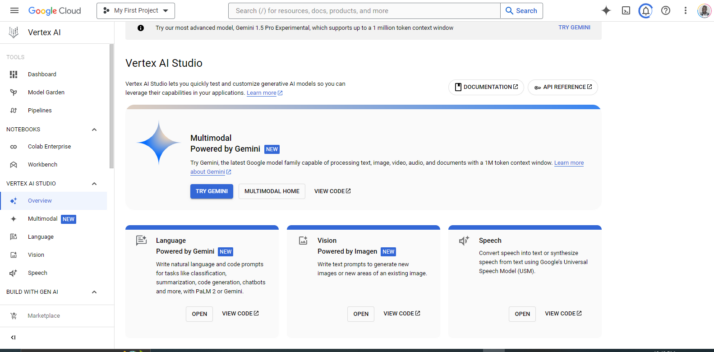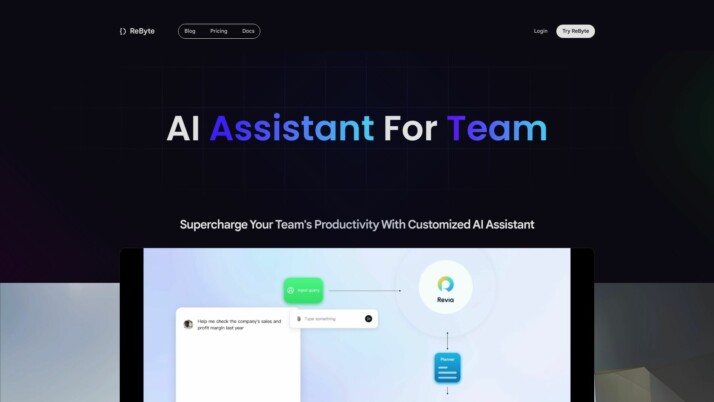Vertex AI vs. Rebyte: Choosing the Right AI Development Platform
AI development platforms Vertex AI vs. Rebyte offer powerful capabilities for creating intelligent applications, but SmythOS stands out as the superior choice for businesses seeking to harness AI’s full potential. This comparison explores how each platform approaches AI development, highlighting their strengths and limitations. We’ll examine key features, ease of use, and deployment options to help you determine which solution best fits your organization’s needs. Whether you’re a seasoned developer or new to AI, this guide will provide valuable insights into the tools shaping the future of AI-driven innovation.
Vertex AI Overview
Vertex AI empowers developers and businesses to build, deploy, and manage machine learning models at scale. Google’s platform combines powerful AI capabilities with robust infrastructure, enabling users to create sophisticated AI applications across various industries.
Vertex AI’s standout feature, the Gemini model, processes multimodal inputs including text, images, audio, and video. This versatility allows developers to craft AI agents capable of advanced reasoning, multiturn chat, and code generation. The platform’s Model Garden offers a curated selection of pre-trained models, streamlining the development process for both novice and experienced users.


Screenshot from Vertex AI studio.
Vertex AI’s standout feature, the Gemini model, processes multimodal inputs including text, images, audio, and video. This versatility allows developers to craft AI agents capable of advanced reasoning…
The platform excels in model customization and deployment. Users can fine-tune Google’s foundation models to specific use cases, improving response accuracy and reducing costs. Vertex AI’s MLOps tools facilitate seamless model management, from version control to performance monitoring, ensuring AI applications remain effective and up-to-date.
Vertex AI’s enterprise-grade security features, including data encryption and access controls, address the critical need for data protection in AI development. However, the platform’s complexity may present a learning curve for users new to machine learning, potentially requiring additional training or expertise to fully leverage its capabilities.
Integration capabilities stand out as a key strength of Vertex AI. The platform seamlessly connects with other Google Cloud services and supports various APIs, enabling developers to create comprehensive AI solutions that tap into diverse data sources and functionalities. This interoperability positions Vertex AI as a versatile choice for organizations looking to embed AI throughout their tech stack.
Rebyte Overview
Rebyte empowers users to rapidly develop AI-powered applications without extensive coding skills. The platform’s visual agent builder allows creation of customizable AI agents with multi-step workflows using large language models. Users can construct complex backend logic and fully customized user interfaces without writing code.


Screenshot of Rebyte Website
Rebyte’s serverless runtime handles hosting, orchestration, testing, and production deployment of AI agents. The platform manages the entire lifecycle of generated AI applications with minimal manual coding required. This approach democratizes AI development, enabling knowledge workers and teams to automate workflows and boost productivity through no-code interfaces.
Rebyte empowers users to rapidly develop AI-powered applications without extensive coding skills. The platform’s visual agent builder allows creation of customizable AI agents with multi-step workflows using large language models.
Key capabilities include integrations with private data sources, detailed observability into agent operations, and a focus on end-user programming through AI. Rebyte aims to usher in an era where anyone can transform ideas into deployed AI applications simply by describing their requirements.
While Rebyte offers powerful visual development tools, it may have limitations for users needing extensive customization or integration with specific enterprise systems. The platform’s no-code approach, while accessible, could potentially constrain advanced developers seeking granular control. Additionally, as with many cloud-based services, users should carefully consider data privacy and security implications when handling sensitive information.
Rebyte positions itself as an enabler of AI-driven innovation for businesses and individuals alike. By lowering the technical barriers to AI development, the platform opens up new possibilities for automation and intelligent applications across various industries and use cases.
Feature Comparison
Vertex AI and Rebyte offer powerful AI development capabilities, but diverge in their approach and feature sets. Vertex AI provides a comprehensive suite of machine learning tools and infrastructure, while Rebyte focuses on no-code AI agent creation.
In terms of core components, Vertex AI excels with its extensive model management capabilities, including a Model Registry and Feature Store. These enable robust MLOps workflows for versioning and serving ML features. Rebyte, in contrast, emphasizes its visual agent builder that allows users to create AI agents without coding. This no-code approach makes AI development more accessible but may limit advanced customization options compared to Vertex AI’s more technical toolkit.
Security features highlight another key difference. Vertex AI offers enterprise-grade security with data encryption, OAuth authentication, and IP access controls — critical for organizations handling sensitive data. Rebyte’s documentation provides less detail on security measures, potentially indicating a gap for users with strict compliance requirements.
While both platforms support AI agent deployment, Vertex AI’s integration with Google Cloud offers more robust scalability and deployment options across various environments. Rebyte’s serverless runtime simplifies deployment, but may not match Vertex AI’s enterprise-scale capabilities. Overall, Vertex AI provides a more comprehensive platform for organizations needing advanced ML capabilities and robust security, while Rebyte excels at enabling rapid AI agent development for users without extensive coding expertise.
Feature Comparison Table
| Vertex AI | Rebyte | SmythOS | |
|---|---|---|---|
| CORE FEATURES | |||
| No-Code Options | ❌ | ✅ | ✅ |
| Autonomous Agents | ✅ | ❌ | ✅ |
| Multimodal | ✅ | ❌ | ✅ |
| Multi-Agent Collaboration | ✅ | ❌ | ✅ |
| Audit Logs for Analytics | ❌ | ✅ | ✅ |
| SECURITY | |||
| Constrained Alignment | ✅ | ❌ | ✅ |
| Data Encryption | ✅ | ❌ | ✅ |
| OAuth | ✅ | ❌ | ✅ |
| IP Control | ✅ | ❌ | ✅ |
| COMPONENTS | |||
| Huggingface AIs | ❌ | ❌ | ✅ |
| Zapier APIs | ❌ | ✅ | ✅ |
| Classifiers | ✅ | ❌ | ✅ |
| Logic | ✅ | ❌ | ✅ |
| Data Lakes | ✅ | ❌ | ✅ |
| DEPLOYMENT OPTIONS (EMBODIMENTS) | |||
| Deploy as Webhook | ✅ | ❌ | ✅ |
| Staging Domains | ✅ | ❌ | ✅ |
| Production Domains | ✅ | ❌ | ✅ |
| API Authentication (OAuth + Key) | ✅ | ❌ | ✅ |
| Deploy as Scheduled Agent | ✅ | ❌ | ✅ |
| DATA LAKE SUPPORT | |||
| Sitemap Crawler | ❌ | ❌ | ✅ |
| YouTube Transcript Crawler | ❌ | ❌ | ✅ |
| URL Crawler | ✅ | ❌ | ✅ |
Best Alternative to Vertex AI and Rebyte
SmythOS emerges as our superior alternative to Vertex AI and Rebyte, offering a versatile AI automation platform that combines ease of use with powerful features. We designed SmythOS to empower users of all skill levels to create and deploy sophisticated AI agents quickly and efficiently.
Our drag-and-drop interface simplifies the agent creation process, eliminating the need for extensive coding knowledge. This visual approach to AI development sets SmythOS apart from Vertex AI’s more technical toolkit and expands upon Rebyte’s no-code focus. We provide a comprehensive suite of pre-built components and templates, enabling rapid deployment of AI solutions across various use cases.
SmythOS excels in its extensive integration capabilities, supporting a wide range of AI models, APIs, and data sources.
SmythOS excels in its extensive integration capabilities, supporting a wide range of AI models, APIs, and data sources. Unlike Vertex AI’s focus on Google’s ecosystem or Rebyte’s limited integrations, we offer seamless connections to popular services like Slack, GitHub, and Stripe, as well as support for custom APIs. This flexibility ensures that SmythOS can adapt to virtually any workflow or business process.
Security and scalability set SmythOS apart from competitors. We implement robust security measures, including data encryption, OAuth authentication, and IP access controls – matching Vertex AI’s enterprise-grade security while surpassing Rebyte’s offerings. Our platform scales effortlessly to meet growing demands, supporting both small-scale projects and enterprise-level deployments with equal efficiency.
By choosing SmythOS, users gain access to a powerful, user-friendly platform that combines the best aspects of Vertex AI and Rebyte while offering unique advantages. We enable businesses to harness the full potential of AI, driving innovation and efficiency across industries.
Conclusion
Vertex AI and Rebyte offer powerful AI development capabilities, but SmythOS emerges as the superior choice for businesses seeking to harness AI’s full potential. While Vertex AI excels in enterprise-grade machine learning and Rebyte focuses on no-code AI agent creation, SmythOS combines the best of both worlds with unparalleled versatility and ease of use.
SmythOS’s drag-and-drop interface and extensive integration ecosystem democratize AI development, making it accessible to both technical and non-technical users. The platform’s support for multi-agent orchestration and versatile deployment options, including integration with popular services like Google Vertex and Amazon Web Services Bedrock, sets it apart from competitors.
Unlike Vertex AI’s complex learning curve or Rebyte’s potential limitations for advanced customization, SmythOS strikes an optimal balance. It offers the robustness required for enterprise-level applications while maintaining the simplicity needed for rapid development and deployment. This unique combination allows businesses to create sophisticated AI solutions 99% faster than traditional methods, driving innovation and efficiency across industries.
To experience the transformative power of SmythOS for yourself, create a free account today. With unlimited agents, a 30-day money-back guarantee, and access to over 300,000 integrations, you can start building and deploying AI agents immediately. Explore our comprehensive documentation to unlock the full potential of SmythOS and revolutionize your approach to AI development.
Last updated:
Disclaimer: The information presented in this article is for general informational purposes only and is provided as is. While we strive to keep the content up-to-date and accurate, we make no representations or warranties of any kind, express or implied, about the completeness, accuracy, reliability, suitability, or availability of the information contained in this article.
Any reliance you place on such information is strictly at your own risk. We reserve the right to make additions, deletions, or modifications to the contents of this article at any time without prior notice.
In no event will we be liable for any loss or damage including without limitation, indirect or consequential loss or damage, or any loss or damage whatsoever arising from loss of data, profits, or any other loss not specified herein arising out of, or in connection with, the use of this article.
Despite our best efforts, this article may contain oversights, errors, or omissions. If you notice any inaccuracies or have concerns about the content, please report them through our content feedback form. Your input helps us maintain the quality and reliability of our information.
